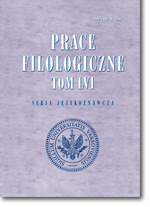Zły to uczeń, który nie przewyższa swego mistrza. O właściwościach relacji {mistrz – uczeń}
{It Is a Bad Apprentice who Does not Excel His Master}. Characteristics of the Relation between {mistrz} and {uczeń} in the Polish Language
Author(s): Katarzyna Dróżdż-Łuszczyk, Zofia ZaronSubject(s): Language and Literature Studies
Published by: Wydział Polonistyki Uniwersytetu Warszawskiego
Keywords: mistrz; uczeń; relacje; znaczenie; master; apprentice; relationship; meaning
Summary/Abstract: The paper presents the results of research into the relation between the lexemes {mistrz} (master) and {uczeń} (apprentice). Some phrases ({mój mistrz, mój uczeń}) and syntactic features suggest a kind of convertive relation. Both lexemes are – for example – three-actant: {ktoś, czyjś, w jakiejś dziedzinie wiedzy (sztuki)} (someone, someone’s, in a field of science (art). This feature is not sufficient to make a convertive relation. In the Polish language the {mistrz-uczeń} relation is a unilateral one. The relation depends on the apprentice who selects a master. The master confirms this only if {uczeń} (apprentice) is taught by the master and if the master is regarded by the apprentice as a skilled, knowledgeable person.
Journal: Prace Filologiczne
- Issue Year: 2009
- Issue No: 56
- Page Range: 133-142
- Page Count: 10
- Language: Polish

